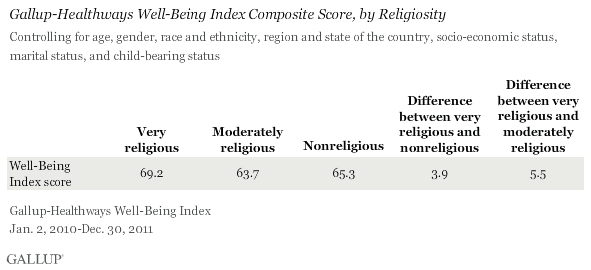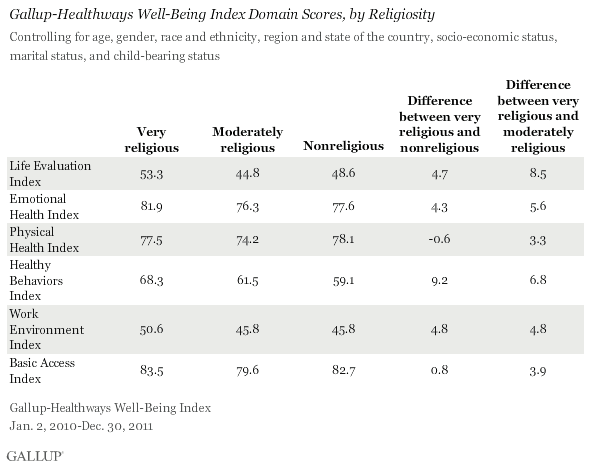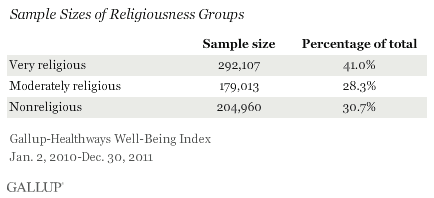This article is part of a special multipart series on religiosity and wellbeing in America. Previous articles have examined religiosity and emotional health and reviewed the relationship between religion and physical health.
PRINCETON, NJ -- An analysis of more than 676,000 Gallup-Healthways Well-Being Index interviews conducted in 2011 and 2010 finds that Americans who are the most religious have the highest levels of wellbeing. The statistically significant relationship between religiousness and wellbeing holds up after controlling for numerous demographic variables.

For the purposes of this analysis, an American's relative degree of religiousness is based on responses to two questions asking about the importance of religion and church attendance, yielding three specific groups:
- Very religious -- Religion is an important part of daily life and church/synagogue/mosque attendance occurs at least every week or almost every week. This group comprises 41% of the adult population.
- Moderately religious -- All others who do not fall into the very religious or nonreligious groups but who gave valid responses on both religion questions. This group comprises 28.3% of the adult population.
- Nonreligious -- Religion is not an important part of daily life and church/synagogue/mosque attendance occurs seldom or never. This group comprises 30.7% of the adult population.
Previous research has shown that religiosity, defined either as church attendance or as self-reported importance of religion, is related to age, gender, race and ethnicity, region and state of the country, socio-economic status, marital status, and child-bearing status. Because wellbeing is also related to these variables, all of these characteristics are controlled for in this Gallup analysis.
The difference in wellbeing between the religious and nonreligious populations is highly statistically significant given the large sample size Gallup's research uses, and would occur by chance alone on an infrequent basis. The difference is also notable given that the Well-Being Index scores do not vary widely across sub-groups of the U.S. population. For example, across all 50 states and the District of Columbia, the range in Well-Being Index scores from the highest scoring state to the lowest scoring state is about 10 percentage points.
Wellbeing Higher for Religious Americans Across Well-Being Sub-Indexes
The Gallup-Healthways Well-Being Index comprises six sub-indexes. Very religious Americans enjoy at least modestly higher scores across most of the wellbeing areas, compared with moderately and nonreligious Americans. The one exception is the Physical Health sub-index, which is slightly higher for nonreligious Americans than for very religious Americans.

The most substantial differences between the very religious and nonreligious groups are in the Healthy Behaviors, Work Environment, Life Evaluation, and Emotional Health Indexes. Differences between the very religious and nonreligious on the Basic Access Index are smaller, but statistically significant. In four of the six cases, the larger gap exists between the very religious and moderately religious groups, rather than between the very religious and nonreligious groups.
The large distinction between those who are religious and nonreligious on the Healthy Behaviors Index is largely because of differences in smoking habits, and to a lesser degree, healthy eating differences.
Implications
Americans who are very religious have higher wellbeing than those who are less religious, a relationship that holds even after controlling for a number of related demographic and geographic variables.
This study does not allow for a precise determination of why this might be the case. It is possible that Americans who have higher wellbeing are more likely to choose to be religious than those with lower wellbeing, or that some third variable could be driving certain segments of the U.S. population to be more religious and to have higher wellbeing.
It is also possible that the relationship is straightforward, that something about religiosity, defined as a personal importance placed on religion and frequent religious service attendance, in turn leads to a higher level of personal wellbeing. Religious service attendance promotes social interaction and friendship with others, and Gallup analyses have clearly shown that time spent socially and social networks themselves are positively associated with high wellbeing. Religion generally involves more meditative states and faith in a higher power, both of which have been widely used as methods to lower stress, reduce depression, and promote happiness. Religion provides mechanisms for coping with setbacks and life's problems, which in turn may reduce stress, worry, and anger. Many religions, including Christianity, by far the dominant religion in the U.S., embody tenets of positive relationships with one's neighbors and charitable acts, which may lead to a more positive mental outlook.
Highly religious Americans' healthier behaviors may have multiple causes, including for example culturally negative norms against such behaviors as smoking and alcohol consumption in various religions. It may also be possible that the lower emotional wellbeing of less religious Americans puts them in a state in which they are more susceptible to non-healthy behaviors.
Gallup will continue to explore the relationship between wellbeing and religion in future articles.
Editor's Note: This article revises and updates a previous analysis based on 2008 and 2009 data.
About the Gallup-Healthways Well-Being Index
The Gallup-Healthways Well-Being Index tracks wellbeing in the U.S., U.K., and Germany and provides best-in-class solutions for a healthier world. To learn more, please visit well-beingindex.com.
Survey Methods
Results are based on telephone interviews conducted as part of the Gallup-Healthways Well-Being Index survey Jan. 2, 2010-Dec. 30, 2011, yielding a random sample of 676,080 adults, aged 18 and older, living in all 50 U.S. states and the District of Columbia, selected using random-digit-dial sampling. Of this sample, very religious respondents comprised the plurality (41%), with slightly more than one-quarter each for moderately religious and nonreligious respondents.

For results based on the sample of these three religiosity classes of national adults, one can say with 95% confidence that the maximum margin of sampling error is less than ±0.5 percentage point for each group.
Interviews are conducted with respondents on landline telephones and cellular phones, with interviews conducted in Spanish for respondents who are primarily Spanish-speaking. Each sample includes a minimum quota of 400 cell phone respondents and 600 landline respondents per 1,000 national adults, with additional minimum quotas among landline respondents by region. Landline telephone numbers are chosen at random among listed telephone numbers. Cell phone numbers are selected using random-digit-dial methods. Landline respondents are chosen at random within each household on the basis of which member had the most recent birthday.
Samples are weighted by gender, age, race, Hispanic ethnicity, education, region, adults in the household, and phone status (cell phone only/landline only/both, cell phone mostly, and having an unlisted landline number). Demographic weighting targets are based on the March 2011 Current Population Survey figures for the aged 18 and older non-institutionalized population living in U.S. telephone households. All reported margins of sampling error include the computed design effects for weighting and sample design.
In addition to sampling error, question wording and practical difficulties in conducting surveys can introduce error or bias into the findings of public opinion polls.
For more details on Gallup's polling methodology, visit www.gallup.com.
